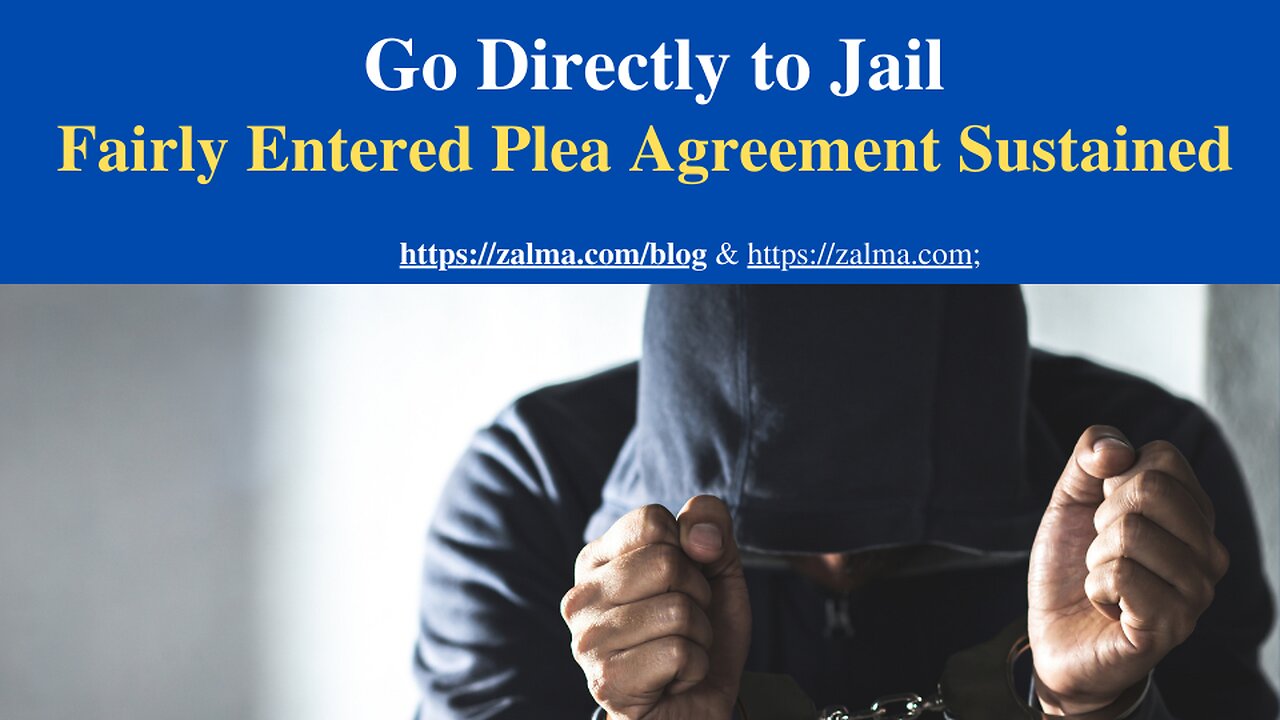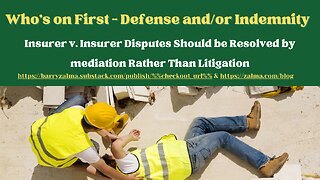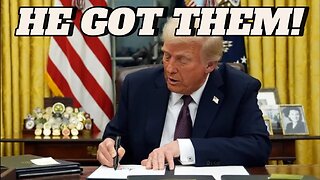Premium Only Content

Go Directly to Jail
Fairly Entered Plea Agreement Sustained
In United States Of America v. Joshua Louis Rupp, No. 22-1240, United States Court of Appeals, Sixth Circuit (January 24, 2023) a case involving a fraud that only tangentially deals with insurance fraud, resulted in 16 years in jail for the fraudster.
FACTUAL BACKGROUND
Pretending to be a licensed securities broker, Joshua Rupp defrauded his in-laws and friends of a total of $2.7 million. Among other tricks, Rupp downloaded an app onto his victims' phones so that they could monitor "dummy" accounts showing excellent (but fictitious) gains. Rupp pleaded guilty to securities fraud.
During plea negotiations, the government estimated that his guidelines range would be about 10 to 12 years' imprisonment. Yet the district court calculated his range to be significantly higher and sentenced him to 16 years.
Rupp argued that he entered an unknowing and involuntary plea because his decision to plead guilty turned on the government's mistaken estimate of his guidelines range. Rupp also argued that the district court should not have increased his guidelines range with an enhancement that covers those who use "sophisticated means" to commit fraud. He lastly argued that the court imposed a substantively unreasonable sentence. But his plea agreement and plea colloquy both showed that Rupp knew that he could not void his plea simply because the district court chose a higher-than-expected guidelines range. Rupp also used plenty of "sophisticated" means, including the creation of the dummy accounts. And his plea agreement waived his right to bring a substantive-reasonableness challenge to his sentence.
In 2015, when Rupp turned to securities fraud, he swindled family and friends alike of millions of dollars over the next four years. Rupp targeted his wife's parents as his first victims. His in-laws initially gave him a small sum after he led them to believe that he had connections with a fictitious broker at an established financial-services firm. Rupp wasted all of these funds, causing his wife's parents to suffer significant tax consequences in the process. His marriage did not survive his fraud.
Fraud soon expanded outside his family. Apart from the app that he downloaded onto his victims' phones to monitor the "dummy accounts" that he had created, Rupp engaged in many other fraudulent acts to persuade them to invest with him. He claimed that the victims could not lose the principal that they entrusted to him because of the nature of his investments. (They lost nearly all of it.) All told, Rupp took more than $2.7 million from 19 people. He spent at least $500,000 of this money on vacations, groceries, and other personal expenses. He frittered away the rest on bad stock trades.
THE PLEA AGREEMENT
He agreed to waive his right to appeal except on a few specified grounds, including that his plea was unknowing and involuntary and that the district court had miscalculated his guidelines range. At Rupp's plea hearing, a magistrate judge found that he had entered a knowing and voluntary guilty plea. Before doing so, the judge confirmed that Rupp understood the nature of the charges and the potential punishment. Rupp recognized that only the district court could determine his guidelines range. He also conceded that nobody had promised him what sentence the court would choose. And he agreed that he could not withdraw his plea if it turned out that the court chose a sentence longer than he anticipated.
At sentencing, Rupp's counsel argued against the sophisticated-means enhancement on the ground that its application, when combined with the other enhancements, would result in improper "double counting" by punishing him twice for the same conduct.
Adopting the presentence report's calculations, the District Court concluded that Rupp's guidelines range was 168 to 210 months' imprisonment. When speaking to the court, Rupp suggested that the report's recommended range had caught him "off guard" because the government in plea negotiations had predicted that his range would be 10 to 12 years. The court nevertheless chose a sentence of 192 months' imprisonment. When the court told him he would have the opportunity to appeal, he responded: "Oh, I will."
Knowing and Voluntary Plea.
Rupp's argument rests on discussions from the parties' plea negotiations that he did not introduce into evidence. Rupp's offense level turned out to be 32 and his criminal history category turned out to be IV.
His plea agreement and plea colloquy both show that he knew that any earlier sentencing estimate would not bind the court and that he could not void his plea if the estimate turned out to be wrong.
Rupp understood that the district court could impose a sentence up to 25 years' imprisonment for his offense. He acknowledged that "only" the district court could "determine" his guidelines range and that the court could vary upward from this range when imposing a sentence.
Substantive Reasonableness.
Rupp attempted to avoid this unambiguous waiver by alleging that he did not knowingly and voluntarily enter the plea agreement. The record left no doubt that he knowingly agreed to that specific provision.
Rupp instead merely reincorporates the general argument that his entire plea was unknowing and involuntary because of the government's mistaken sentencing estimate - it didn't work and the District Court's Order was affirmed.
ZALMA OPINION
Assuring his victims that they could not lose their principal - a lie only the innocent would believe - Rupp lived the high life on other people's money - until it all ran out, his wife left him and the DOJ brought him towards trial. He plead guilty hoping to receive a lesser sentence with knowledge that he could not force the court to agree. He lost. He is in jail for 16 years and his arguments were dismissed by the Sixth Circuit with alacrity.
(c) 2023 Barry Zalma & ClaimSchool, Inc.
Subscribe and receive videos limited to subscribers of Excellence in Claims Handling at locals.com https://zalmaoninsurance.locals.com/subscribe.
Go to substack at substack.com/refer/barryzalma Consider subscribing to my publications at substack at substack.com/refer/barryzalma
Barry Zalma, Esq., CFE, now limits his practice to service as an insurance consultant specializing in insurance coverage, insurance claims handling, insurance bad faith and insurance fraud almost equally for insurers and policyholders. He practiced law in California for more than 44 years as an insurance coverage and claims handling lawyer and more than 54 years in the insurance business. He is available at http://www.zalma.com and zalma@zalma.com
Write to Mr. Zalma at zalma@zalma.com; http://www.zalma.com; http://zalma.com/blog; daily articles are published at https://zalma.substack.com. Go to the podcast Zalma On Insurance at https://anchor.fm/barry-zalma; Follow Mr. Zalma on Twitter at https://twitter.com/bzalma; Go to Barry Zalma videos at Rumble.com at https://rumble.com/c/c-262921; Go to Barry Zalma on YouTube- https://www.youtube.com/channel/UCysiZklEtxZsSF9DfC0Expg; Go to the Insurance Claims Library – https://zalma.com/blog/insurance-claims-library
-
 10:17
10:17
Barry Zalma, Inc. on Insurance Law
1 year agoWho's on First - Defense and/or Indemnity
186 -
 LIVE
LIVE
GamersErr0r
3 hours ago $0.68 earnedMooning My Community
319 watching -
 2:22:59
2:22:59
Banks Atkin Live
5 hours agoChilling playing Games & Vibin
47.6K1 -
 LIVE
LIVE
Dragoon_B
7 hours agoNothing crazy - just Counter Strike + Valorant
74 watching -
 18:03
18:03
Stephen Gardner
6 hours ago🔥YES!! Trump GETS HUGE win in 4th district court!!
65.1K376 -
 4:40:54
4:40:54
G3T
5 hours ago🔴GET | not saying it
17K -
 15:35
15:35
DeVory Darkins
11 hours ago $3.92 earnedGavin Newsom drops CRUSHING BLOW on Democrats
22K65 -
 LIVE
LIVE
Etheraeon
8 hours agoPUBG: Battlegrounds | Total Bot Domination
119 watching -
 3:18:33
3:18:33
House of Jacobs
4 hours agoElden Drinks - Drunk Souls Series
14.1K1 -
 3:12:13
3:12:13
BubbaSZN
7 hours ago🔴 LIVE - SPIDER-MAN 2 - PART 3
14.9K1